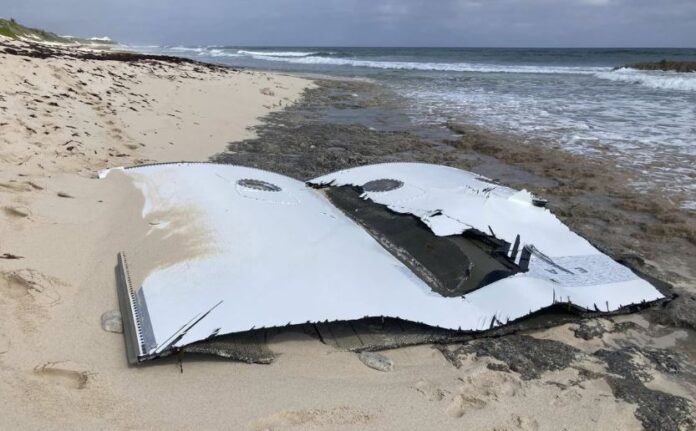Debris from recent rocket launches by Blue Origin and SpaceX has been discovered in multiple locations, highlighting the growing issue of space junk returning to Earth. A large section of a Blue Origin rocket’s nose cone washed ashore on a Bahamian island near a popular tourist destination, while flaming debris from a SpaceX launch vehicle was seen streaking across the sky over Germany. Additionally, what appears to be a fuel tank from a SpaceX Falcon 9 rocket may have landed on private property in Poland.
Uncontrolled Reentry Over Europe
The European Space Agency (ESA) confirmed that the SpaceX debris originated from the upper stage of a Falcon 9 rocket, which launched on February 1 from California carrying Starlink satellites. Instead of a controlled descent into the ocean, the upper stage re-entered Earth’s atmosphere over Europe in an uncontrolled manner and broke apart in midair.

Residents across Germany and Poland reported seeing the burning rocket fragments, with one train driver in Germany capturing the dramatic scene on video. In Poland, a local business, Elektro-Hurt, shared images of a fuel tank-sized object that had landed on its property, describing it as an “extraordinary delivery.”

SpaceX has not yet commented on the incident, and the U.S. Federal Aviation Administration (FAA) has not launched an investigation but has given the company 90 days to report any anomalies related to the launch.
Blue Origin Debris Washes Up in Bahamas
In a separate event, a large portion of a Blue Origin New Glenn rocket’s nose cone was discovered on a beach in the Bahamas. Unlike the SpaceX incident, this was not the result of a failed launch but rather an expected stage separation from Blue Origin’s January 16 maiden flight.
The nose cone fragment, which bears the signatures of Blue Origin employees, traveled a significant distance before reaching the shoreline, raising concerns about space debris drifting into populated or environmentally sensitive areas.

Growing Concerns Over Space Junk
According to the European Space Agency, satellites and rocket components re-enter Earth’s atmosphere almost daily, with most disintegrating before impact. However, the increase in rocket launches worldwide has led to a higher likelihood of debris reaching populated areas.
Experts warn that space debris, particularly fuel tanks and rocket components, can be hazardous if toxic materials or volatile fuels are involved.
Marlon Sorge, executive director of the Center for Orbital and Reentry Debris Studies, emphasized that while most space debris poses minimal danger, handling unknown objects can be risky. “If weakened, some components can explode upon contact,” he warned.
Regulatory Oversight and Future Risks
The recent discoveries in the Bahamas and Europe highlight the need for stricter regulations and improved reentry safety measures. While most debris burns up upon reentry, these incidents demonstrate that larger rocket components can survive the descent and pose risks to people and infrastructure.
As space activity accelerates, the challenge of managing space debris and ensuring public safety will become increasingly urgent for regulatory agencies and private space companies alike.
Key Points:
Debris Discovery: Large rocket fragments from Blue Origin and SpaceX were found in the Bahamas, Germany, and Poland this week.
Blue Origin Debris: A massive piece of a New Glenn rocket’s nose cone washed up on a Bahamian island, likely after its January 16 maiden flight.
SpaceX Debris Over Europe: The upper stage of a Falcon 9 rocket, launched on February 1, re-entered Earth’s atmosphere in an uncontrolled manner over Europe.
Visual Sightings: Residents in Germany and Poland witnessed flaming rocket fragments streaking across the sky, with a German train driver capturing the event on video.
Polish Discovery: A fuel tank-sized object believed to be from Falcon 9 was found on private property in Poland.
SpaceX Response: SpaceX has not commented on the debris, and the FAA has not launched an investigation but has given the company 90 days to report any anomalies.
Space Debris Risks: Experts warn that rocket components and fuel tanks can pose safety hazards, particularly if they contain toxic or volatile materials.
Growing Space Junk Issue: With an increase in rocket launches, the likelihood of space debris reaching populated areas is rising, raising concerns over safety and regulatory oversight.



